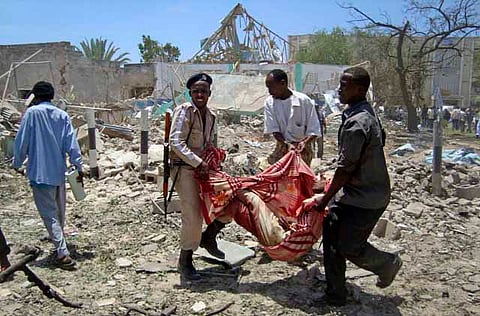Al Shabab on backfoot
Divided and in retreat, the question is whether the militant group’s death throes will drag Somalia into another cycle of violence

There was a time when Al Shabab, Somalia's largest and most notorious Islamist militia, inspired fear and awe across that ravaged land. But the group's latest terror attack, on the national theatre in Mogadishu, is a sign of weakness, not strength. Al Shabab is divided, under pressure and in retreat. The question now is whether its death throes may drag Somalia into another cycle of violence and death.
A key turning point came last autumn with Kenya's military intervention in the south, provoked by a series of kidnappings and border incidents. African Union (AU) forces had already expelled Al Shabab from most of Mogadishu in August.
The Kenyans, backed by Ethiopian troops, challenged the group's control of south and central Somalia, and it has been on the back foot ever since. AU reinforcements are now on the way.
Al Shabab has responded with a spate of sporadic, indiscriminate and strategically incoherent attacks in which many civilians have been killed. It has mounted assaults on the transitional federal government in Mogadishu, on targets inside Kenya (Mombasa was hit recently) and in semi-autonomous north-eastern region of Puntland, where its displaced fighters appear to be seeking a new foothold.
The international conference on Somalia hosted by Britain earlier this year made clear that western powers and their African partners were determined to keep up the pressure. New UN sanctions have meanwhile been imposed on Eritrea's anti-western regime, a chief sponsor of Al Shabab's campaign to expel all foreign forces and create an Islamic state in Somalia ruled by Sharia law.
The militia's decision earlier this year to formally enlist with Al Qaida seems to have backfired, crystallising internal divisions. It united moderate local and regional forces against them, and persuaded Shaikh Hassan Dahir Aweys, the spiritual leader of Somalia's Islamists who merged his forces with Al Shabab in 2010, to openly challenge the group's military leadership recently.
Negotiated settlement
"The unprecedented outburst from Aweys might just mark [the point at which] the previously unified movement began to unravel," said commentator Simon Allison.
"Wake up and open your eyes," Aweys said on a public radio station. Al Shabab's use of violence and oppression to ensure obedience was a tactic Aweys described as mirroring the treatment meted out by hated dictator Siad Barre. And he questioned Al Shabab's claim to a monopoly on jihad.
Allison pointed out that Aweys is no ordinary cleric, but rather a man of immense personal authority who is more of a Somali nationalist than a jihadist.
"That pitted him against the faction led by Ahmad Abdi Godane, who also goes by the pseudonym Mukhtar Abu Zubeyr. He's angling to be Al Qaida's main man in east Africa and was behind the Al Shabab-Al Qaida merger last month".
Aweys and his allies within Al Shabab's leadership have hinted at a negotiated settlement. That is anathema to the hardliners around Godane. Their answer has been to step up random terror attacks, like that in Mogadishu on Wednesday, to make a deal impossible.
Aweys gave a rare interview to the Guardian in 2008 in the Eritrean capital of Asmara, in which he jokingly called himself Somalia's Thomas Jefferson. He said he wanted an Islamic republic, but his primary objective was to have all foreign forces leave.
"Every country has the right to fight for its freedom. If the United Kingdom was invaded, would the British people not fight the invaders?" he asked.
Fair and balanced mediation by the international community would be acceptable but it was currently not on offer, he said. The US and proxies such as Ethiopia were pursuing their own interests, which made peace unattainable.
Four years on, Aweys may be about to try again.
— Guardian News & Media Ltd


